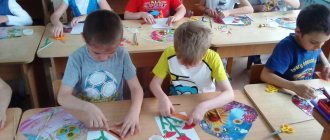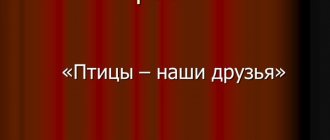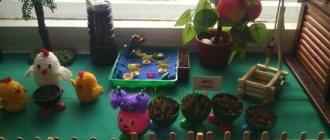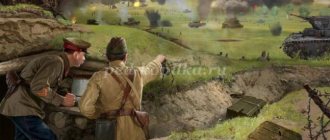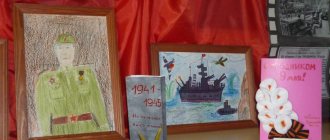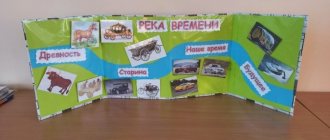The brochure presents the experience of methodological work on forming the foundations of patriotism in preschoolers, provides scenarios for entertainment with children, the script for the reading marathon “Victory Day”, the sports and entertainment festival “Come on, boys! "in the preparatory group, a script for a literary and musical composition, a game" brain ring, recommendations for working with parents "How to tell a child about the war", as well as short stories about partisans, the blockade, medical care, about the rear and more. The brochure also includes a plan of events for April and May for the spiritual and moral education of preschoolers. Project “Let us bow to those great years, dedicated to the 72nd anniversary of the Great Victory.” The brochure contains photographic materials from the kindergarten. The manual is addressed to practical workers of preschool educational institutions.
Relevance
In recent decades, many complex, contradictory events have occurred in our country regarding public life, politics, and the system of state and local government. Some holidays have become a thing of the past, new ones have appeared; facts related to national confrontation are increasingly being noted among young people; The media intensively promote the Western way of life, which is alien to us. During the period of change of social formations, the continuity of generations in raising children is disrupted. The modern generation does not know enough about and is interested in the events of the Great Patriotic War. It is very important that from preschool age children learn as much as possible about the tragic events of 1941-1945. Therefore, at the present stage, the problem of moral and patriotic education of children is so relevant.
On the eve of the celebration of the 70th anniversary of the Great Patriotic War, a survey was conducted with children of senior preschool age to identify knowledge and ideas about the Great Patriotic War, about the heroes of the war, the reasons for the holiday, which showed the children’s low level of knowledge. Thus, it was decided to create a single educational space “Family, Kindergarten, Children’s School of Art No. 14, Airport, House of Culture “Aviator”, branch of library No. 20, MAOU DOP Children and Youth, MAOU Secondary School No. 37”, to develop and implement the project “ Let us bow to those great years,”
The project “May 9 – Victory Day” was built on the basis of interaction between adults and children, and contributed to the development and support of children's initiative and independence in various types of activities.
Author of the project: Municipal budgetary preschool educational institution Kindergarten No. 15 “Rainbow”, Ulan-Ude
Objective of the project:
- Develop a system of measures to prepare for the celebration of the 72nd anniversary of the Victory;
- To develop knowledge about the Second World War through various types of children's activities.
Project objectives:
- Summarize and expand children's knowledge about the history of the Great Patriotic War;
- To give an idea that the people remember and honor the memory of the heroes of the Great Patriotic War of 1941-1945, they compose poems and songs in honor of the heroes, and erect monuments;
- Introduce the military awards of heroes, military equipment, fellow countrymen-heroes who went through the Second World War.
- To develop tolerance, respect for the defenders of the Motherland, and a sense of pride in one’s people.
- Replenish the teaching cabinet with materials about the Second World War.
- Strengthening the moral and patriotic feelings of preschoolers through joint events with the participation of children, their parents, and teachers;
Project participants: Educators, specialists, music directors, children, parent community, Children's Art School No. 14, Airport village, House of Culture "Aviator", branch of the library No. 20, MAOU DOP Children and Youth, MAOU Secondary School No. 37.
Project implementation period: From April 1 to May 9, 2017.
Project type: creative, short-term (from April 1 to May 9)
Content
- 1 Project authors
- 2 Project topic
- 3 Project name
- 4 Item
- 5 Brief summary of the project
- 6 Relevance and originality of the project
- 7 Educational environment of the network project
- 8 Guiding questions 8.1 Guiding question
- 8.2 Problematic issues
- 8.3 Study questions
Stages of work on the project
I. Preparatory stage
- Studying methodological literature on the topic of the project.
- Formulation of goals and objectives.
II. Main stage
Contents of project implementation activities
| № p/p | Project stage | Deadline _ | Project participants | Interaction between project participants | Product of activity | |
| Work with children | ||||||
| 1 | Brain ring "Motherland Day". | 04.04. | Children of older groups | Teachers, music manager, speech therapists. | Brain ring scenario | |
| 2 | Brain-ring “Defenders of the Fatherland”. | 05.04. | Children of preparatory groups | Teachers, music manager, speech therapists. | Brain ring scenario | |
| 3 | Checkers tournament among children and teachers dedicated to the 70th anniversary of the Victory | 06.04. | Children of preparatory groups | Educators, | Photo-video reports | |
| 4 | Excursion to the library “Our city during the war.” | 07.04. | Older and older children groups | Teachers, senior teacher. | Photo-video reports | |
| 5 | Children's drawing competition "Let there always be sunshine." Exhibition of drawings. | 10-14.04. | Children young, middle, older and pre-teens. groups | Art. educator, educators. | Exhibition of drawings | |
| 6 | Concert of the children's group of the music school “Worthy of the Memory of Heroes.” | 13.04 -1 building, 14.04. -2 building, 18.04. -3 building. 04.26.– for teachers, workers and veterans of kindergartens. | Children's Art School No. 14 for children of middle age, old age, prep. groups. | Art. teacher, music leader, teachers. | Festive concert | |
| 7 | Museum exhibition “Let generations remember and be proud” | April May. | Pupils of senior and preparatory groups. | Educators, Art. educators, parents. | Creation of the museum: materials for the exhibition: letters, photographs, wartime clothing, orders and medals, helmets, flasks, etc. | |
| 8 | Sports festival “Come on, boys! " | 18.04. 20.04. | Pupils of senior and preparatory groups. | Physical education instructor. | Scenario of a sports festival. | |
| 9 | Reading competition among pupils of the “Victory Day” kindergarten. | 25.04. | Pupils of junior, middle, senior and preparatory students. groups | Speech therapists, Art. teacher | Photo-video reports | |
| 10 | Crafts competition on the theme “Gift for a Veteran” (joint creativity of children and parents). Exhibition design. | Pupils of junior, middle, senior and preparatory students. groups | Teachers, families of pupils. | Vernissage of crafts | ||
| 11 | Design of the exhibition “Nobody is forgotten, nothing is forgotten.” | End of April | Pupils of junior, middle, senior and preparatory students. groups | Teachers, families of pupils. | Action "Immortal Regiment" | |
| 12 | Parade “Forward to Victory” dedicated to the 72nd anniversary of Victory in the Second World War. | 05.05. | All kindergarten students | Art. educators, educators, speech therapist, educational psychologist, physical education instructor, parents, WWII veteran, music. leaders. | Parade script. | |
| 13 | Reading military fiction to children. Conversation about what you heard. | End of April | Older and older children groups | Educator, senior educator. | Creation of a library of books for children to read about Defenders of the Fatherland. | |
| 14 | Didactic game "Wheel of History". | 28.04. | Children preg. groups | Speech therapist, educational psychologist, educators, senior educator. | Methodological development of a didactic game. | |
| 15 | Concert “May 9 – Victory Day” at the Aviator cultural center. | 3.05. | Older and older children groups | Educator, senior teacher, music teacher leaders. | Song, literary and musical composition “Defenders of the Fatherland.” | |
| 16 | “Giving people joy...” - making souvenirs for WWII veterans. | 04.05. | Pupils of middle, senior and preparatory classes. groups | Educators. | Gifts for veterans. | |
| 17 | Children's concert of MAOU Secondary School No. 37, MAOU Additional Children's and Youth Children's Concert for preschool children. | 06.05. | Pupils of middle, senior and preparatory classes. groups | Music leader, teachers, senior teacher | Event script. | |
| 18 | Festive matinees in honor of the 70th anniversary of the Victory. | Beginning of May | Pupils of junior, middle, senior and preparatory students. groups | Music leader, teachers, senior teacher, parents. | Scenario for the matinee. | |
| 19 | Participation in the city competition of the parent-child project “Echoes of War in My Family”, dedicated to the 70th anniversary of Victory in the Great Patriotic War | 29.04. | Fedorova Diana, gr. No. 11, Zhamyanova Valeria, gr. No. 11 | Educator, senior teacher | Project | |
| Working with teachers | ||||||
| 1 | Design of thematic albums, photo exhibitions, presentations in corridors and staircases:
| April | Art. educators, educators, speech therapist, educational psychologist, physical education instructor, music. leaders. | Thematic albums, photo exhibitions, presentations. | ||
| 2 | Literary and musical creativity of teachers “Let us bow to those great years.” | 26.04. | Art. educators, educators, speech therapist, educational psychologist, physical education instructor, music. managers | Theatrical production, original poems, stories, songs, dances. | ||
| 3 | Business game with teachers “Through the Pages of Victory.” | Beginning of May | Art. educators, educators, speech therapist, educational psychologist, physical education instructor, music. leaders. | Game script, methodological recommendations for its implementation. | ||
| 4 | Pedagogical run “The Great Patriotic War: events and facts.” | May | Art. educators, educators, speech therapist, educational psychologist, physical education instructor, music. leaders. | Methodological development of conducting a pedagogical run. | ||
III. The final stage
- Drawing up a project portfolio.
- Broadcast of the project results in a photo exhibition and video for parents.
- Issue of the children's newspaper "Rainbow", dedicated to the celebration of the 72nd anniversary of the Victory in kindergarten.
- Television report on the Tivikom channel of the Forward to Victory kindergarten parade with the invitation of WWII veteran Tatyana Yakovlevna Khudyakova, major of tank forces, war veteran of Afghanistan, Tajikistan, and the Chechen Republic Gennady Viktorovich Osipenko.
- Release of methodological recommendations for teachers of preschool educational institutions on patriotic education, dedicated to the 72nd anniversary of the Great Victory.
- Design of group, corridor, staircase spaces.
- Sewing military tunics, caps, skirts.
- Scenarios for holidays and all events.
- Moving folders for parents.
- Making weapons, military equipment, tripods for fire.
- Participation in the Victory Parade on May 9 on Soviet Square.
Project implementation is effective
Children:
- The level of awareness of older preschoolers and their parents about the history of mankind has increased through familiarity with the legendary past of Russia during the Great Patriotic War.
- Children are familiar with the symbols of the Russian state.
- Children have an idea about military professions, about the branches of the Russian army
- We got acquainted in more detail with the works of Buryat poets, writers and artists on military topics.
- Children have an expanded vocabulary on the topic “May 9 – Victory Day”
- They also have an idea about the history of the memorable places of their hometown of Ulan-Ude, the hero cities.
- They know how to navigate the historical events of our Motherland and the timeline
- Children are tolerant, have respect for the defenders of the Motherland and a sense of pride in their people.
Teachers:
- Show sensitivity to the interests and capabilities of children;
- Involving all children in different activities and cultural practices;
- Increase professional level.
- Dissimilation of teaching experience.
Formative and summative assessment materials
| Before working on the project | Students work on a project and complete assignments | After completing the project |
| Formative assessment of “starting knowledge” in the form of a frontal conversation during the teacher’s introductory presentation List of research topics Criteria for assessing student research | Assessing student work based on the proposed materials Discussion of preliminary results in each group Filling out the project group promotion table Teacher consultations | Self-assessment of group work Presentation of group work results in a wiki article Speech at a conference lesson Reflection |
Work on the project begins with the fact that during the teacher’s presentation, students’ knowledge on this topic is clarified, students are motivated to conduct research in the project, and research topics are determined.
Taking into account the requirements of the standard, criteria for assessing future work of students are drawn up, according to which monitoring and self-control takes place in groups. Before starting work, students become familiar with these criteria. During the work, the groups fill out the project progress table, discuss the results obtained, and compare the results obtained with the criteria. For a deep understanding of the topic, didactic materials have been developed for students.
After completion of the work, self-assessment sheets for the group’s work are filled out, and a review wiki article is created reflecting the research results and conclusions obtained.
A lesson-conference is held at which students are heard to present the results of their work. Here the depth of the research, the brevity and clarity of the formulations, the ability to logically present the progress and results of the research, convincingly argue your point of view, ask questions, and activity are assessed.
During the performances, students demonstrate the results of their activities - presentations and publications. At the end of the conference, the conclusions that answer the fundamental question of the project are collectively discussed.
Based on the results of the project, individual reflection is carried out.
Article about assessment in network projects
Self-assessment was carried out as part of the project:
Reflection on the results of the project
Reflection results
Criteria and example for evaluating a wiki page
battle of Borodino
The general battle began on September 7 (August 26), 1812, early in the morning. Kutuzov successfully positioned his troops, stopping all attempts by the French to attack the army from the flanks. Napoleon had no choice but to throw his main forces head-on into well-fortified positions. The battle lasted 12 hours, there were huge losses on both sides - more than 58 thousand people for the French army and almost 46 thousand people for the Russians.
There were no winners in this battle. But the Russian army proved that it could fight on equal terms with Napoleon’s “invincible” army. Napoleon's confidence in victory over Russia was shaken.
Kutuzov understood that a new battle could completely destroy the army, so in the village of Fili on September 13 he decided to further retreat. I had to leave Moscow.
Prerequisites and the beginning of the Patriotic War
In 1807, Russia concluded a peace treaty with the Emperor of France Napoleon I, called the Peace of Tilsit. According to this agreement, Russian Emperor Alexander I pledged to participate in the continental blockade of England.
Napoleon had to withdraw troops from Prussia , which bordered Russia. Neither party fulfilled the terms of the agreement. Alexander I signed an agreement on neutral trade, thereby abandoning the blockade of England, in turn, the Treaty of Tilsit gave Napoleon a free hand, which allowed him to occupy all the states of Europe. Only England retained independence, and only Spain continued to stubbornly resist the invaders. All this allowed Napoleon to move his troops close to the borders of the Russian Empire. War was inevitable.
Napoleon understood perfectly well that he had a serious opponent in front of him. Preparations for the war were carried out very carefully. Large reserves of food and ammunition were created near the borders with Russia. French intelligence was actively collecting information about the potential enemy.
An attempt was made to undermine economically by throwing out counterfeit money. Russian diplomacy took retaliatory steps. Secret agreements were concluded with a number of European states that did not want to fight for other people's interests. They pledged to provide minimal support to Napoleon.
Collapse of Napoleonic Army
Even before the war, Napoleon claimed that if he took Moscow, he would strike Russia in the very heart. In fact, it was Moscow that defeated Napoleonic army. Having entered the city on September 14, Napoleon's army ceased to exist as a combat unit.
Total robbery and violence against the population turned the Grand Army into a bunch of marauders. The once invincible French army was disintegrating before our eyes; when Napoleon realized this, it was too late. He was trapped.
To save the army, Napoleon sent a letter to Emperor Alexander I with a proposal to make peace. But Alexander did not answer. Then Napoleon realized that he had lost. He had no choice but to leave Moscow. And he gave the order to his troops to leave the city.
The French army's communications lines, stretched over hundreds of kilometers, could not provide the troops with everything they needed; moreover, the fire that raged in Moscow for more than a week destroyed all possible food supplies. Napoleon gave the order to retreat, leaving Moscow; the French army was pulling behind it a huge convoy with looted goods, which greatly affected its maneuverability.
Taking advantage of this, Kutuzov cut off Napoleon's troops from the southern provinces and, with the help of auxiliary troops from the north, forced the French to retreat along the old Smolensk road. Napoleon's army was melting before our eyes, due to the lack of provisions, famine began, constant threats to the Russian army, moving in parallel, forced the French to abandon everything just to move forward faster.
At the end of November, the Great Army that reached the Berezina River was a pitiful sight. There was a complete absence of cavalry, all artillery was abandoned, about 40 thousand people were unarmed, wounded and frostbitten. To avoid complete destruction during the crossing from the attacking Russian army, Napoleon ordered the bridges to be burned, fled, and left the remnants of the army to the mercy of fate.
